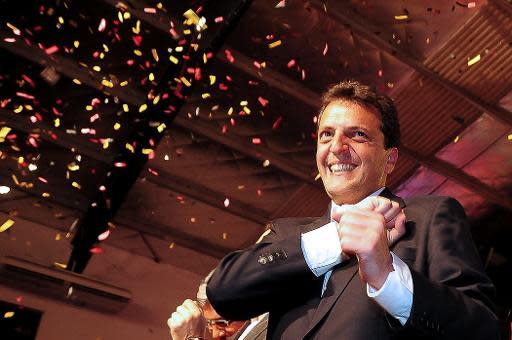Argentina's Kirchner weakened by mid-term vote

Buenos Aires (AFP) - Argentina's Cristina Kirchner began the final leg of her presidency Monday, diminished by her Peronist followers' resounding defeat in Buenos Aires and other key provinces in mid-term elections.
The 60-year-old, who is convalescing from brain surgery, held on to a majority in the bicameral Congress, but with a weakened hand to play in her final two years in office.
Former Kirchner aide turned opposition candidate Sergio Massa, the 41-year-old major of Tigre, scored decisive victory in Buenos Aires province with 44 percent of the vote.
Nearly 40 percent of Argentina's 30 million voters are in Buenos Aires, and his victory there instantly made Massa a top contender for the presidency in 2015.
Kirchner's wing of the Peronist movement, the Front for Victory (FPV), won 33 percent nationwide, giving it a slender three seat majority in the Chamber of Deputies, bolstered by three deputies from a regional party.
Her coalition maintained its majority in the Senate, after a vote in which seats representing half the lower chamber of Congress and a third of the Senate were at stake.
The president "is preparing to return with all her might to continue leading this project," said Vice President Amado Boudou, who has been running the government in her absence.
But the outcome dashed any hopes of the two-thirds legislative majority Kirchner would need to re-write the constitution and run for a third term, as her followers once hoped.
"The FPV lost its reservoir of votes," analyst Jorge Giacobbe told AFP.
Rosendo Fraga, the head of the Nueva Mayoria consulting group, said the results in Buenos Aires defined the elections.
"That is what turned it into a triumph for the opposition and not the government," he said.
Kirchner's forces also lost to various opposition parties in other key districts like the federal capital, Cordoba, Santa Fe and Mendoza.
Defense Minister Agustin Rossi, a former leader of Kirchner's bloc in the lower house, said the government still had enough seats to carry forward its initiatives.
The ruling coalition faces "a multipolar opposition archipelago," he said, adding that "its not enough to win one district, no matter how important it may be."
Massa, who was Kirchner's chief of staff in 2008-2009 but later broke with her, campaigned as a mayor who was tough on crime and installed hundreds of security cameras in the town of Tigre.
He also made an appearance with former New York Mayor Rudolph Giuliani, an advocate of a "zero tolerance" policy against crime.
But his Renewal Front has no presence outside of Buenos Aires province, and Massa acknowledged that he now has to convert his victory in Buenos Aires into national support.
A polarizing figure, Kirchner has seen her popularity sag in recent months, despite a health crisis which some thought might bolster her public support.
Her oldest son Maximo, told AFP on Sunday that Kirchner was "well, and in good spirits" after surgery this month to remove a blood clot on her brain.
She was not, however, quite well enough to cast a ballot, and continues to rest and heal at the presidential residence north of Buenos Aires.
Argentina's first democratically-elected female president, Kirchner has seen her approval rating slide to about 30 percent since she was swept back into office for a second term in 2011.
Mariel Fornoni, head of pollster Management & Fit, said the election was a key barometer of support -- or lack of it -- for the Argentine leader.
"It is a cycle that is ending, and a point of departure. Monday is the beginning of the race for the presidential election of 2015 and control of Peronism," Fornoni said.
Kirchner angered Argentina's business class by failing to control inflation, her protectionist economics, import restrictions, the nationalization of companies such as energy giant YPF, and her foreign exchange controls.
Critics are also skeptical of her foreign policy alignment with anti-Western governments in Bolivia, Ecuador and Venezuela.
But the poor revere the president for her fight against poverty, generous social welfare programs and improved retirement pensions, even though Argentina's economy is sluggish and violent crime is on the rise.
Argentina is still one of the world's agricultural powerhouses, producing and exporting massive amounts of soy, wheat and meat.
Kirchner followed her late husband, Nestor Kirchner, as Argentina's president. Her husband was in office from 2003-2007.


